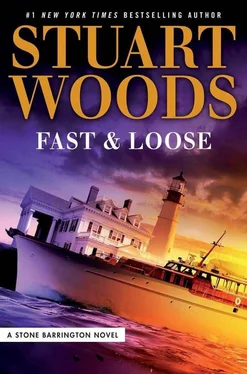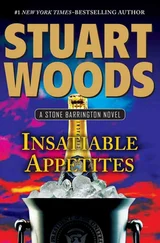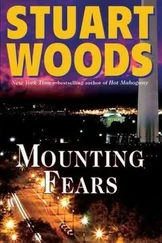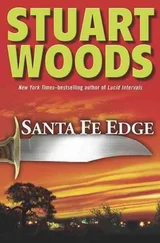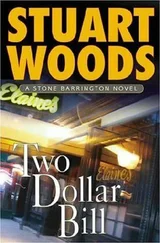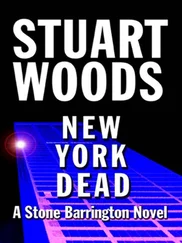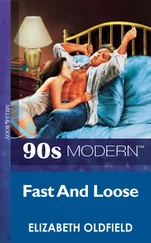“Certainly you may, sir,” Charley replied, with appropriate deference.
“After a long and substantive discussion,” Barnes said, “we would like to offer you the position of chief executive officer of St. Clair Enterprises.” He held up a hand to deter protestations. “In our years of serving Christian St. Clair, we found him to be an excellent judge of both competence and character, and we were all impressed when he introduced us to you.”
Charley allowed himself to breathe again. “Thank you, sir.”
“Before Christian met his untimely death, he had not expressed to us any sort of idea of succession, and then Erik Macher came to us with a will appointing him CEO with extraordinary powers over the board. We have since learned that the will was fraudulent, concocted with the collusion of Thomas Berenson, our former corporate counsel.”
Charley had noticed that Berenson was not present.
Barnes took a sheet of paper from his briefcase and handed it to Charley. “This is our proposal for authority, compensation, and perquisites. Please take as long as you like to peruse it.”
It took Charley about six seconds to take it in, but he pretended to take longer. “Gentlemen,” he said, “this is generous. As you may know, I have entered into a partnership with Mr. Michael Freeman of Strategic Services and Mr. Stone Barrington, a partner in the law firm of Woodman & Weld.”
“We all read that in the Wall Street Journal ,” Barnes replied.
“If I may, I would like them to join us in discussing this matter.”
“Of course, if you wish.”
“If you will excuse me for a moment.”
“Certainly.”
Charley left the room and called upstairs from his secretary’s desk. Mike Freeman answered, and Charley requested to be put on speakerphone.
“Go,” Mike said.
“They’ve offered me the CEO job at St. Clair,” he said.
“And what do you intend to do?” Stone asked.
“I think we should make them an offer for the company,” Charley said.
“What sort of an offer?” Mike asked.
“I’ve been through the assets and the profit-and-loss statements, and I value them at about seven hundred million, including the building and yacht. I propose that we offer them half a billion for the lot. We can then dispose of the companies at our leisure and make a lot of money.”
“Mike?” Stone asked.
“Good idea,” Mike replied.
“Charley, you have our agreement,” Stone said, “but we shouldn’t buy the company, since we’re not aware of what sort of liabilities it may have. Make the offer for the assets only.”
“Right, now get your asses down here pronto!” Charley said. He hung up and waited another minute before returning to his office. “Mr. Freeman and Mr. Barrington will be here shortly,” he said, dragging a couple of chairs over from his desk to the seating area.
As he resumed his seat there was a knock at the door, and Mike and Stone entered. Charley made the introductions.
“Gentlemen, may I continue?”
“Yes, please,” Barnes replied.
“Regretfully, I must decline your generous offer.” He gave them a moment to rearrange their faces. “However,” he said, “the Triangle Partnership, that is, the three of us, would like to acquire all the assets of St. Clair Enterprises.”
Barnes exchanged glances with his fellow board members and received an almost imperceptible nod from each, which indicated to Charley that they had previously discussed this move.
“What is your offer, Mr. Fox?”
“We offer half a billion dollars for all the company’s assets, including the building and the yacht.”
After a brief pause, Barnes said, “We have discussed this possibility, and we concur in our belief that a more acceptable offer would be six hundred million, the value of the assets being what it is.”
“I can understand your feelings in the matter, gentlemen. You could certainly hire a firm like my previous home, Goldman Sachs, to come in, value each property separately, and dispose of them piecemeal. Alternatively, they could seek a buyer for the entire company, but I’m sure you realize that either process would consume many months of your time and many millions in fees and costs. We offer an immediate purchase, to close in, say, thirty days, and we will assume the responsibility of the preparation of the documentation for the sale, to be approved, of course, by your new counsel. Have you chosen one yet?”
“Frankly,” Barnes replied, “we were considering offering Mr. Barrington that position.”
“Thank you, gentlemen, but our offer would make that a conflict of interest. I could recommend someone, if you like.”
“Mr. Fox, may we withdraw to your waiting room for a moment to discuss the matter?” Barnes asked.
Charley stood, and so did Mike and Stone. “Certainly,” he said, and they waited until the board had closed the door behind them before sitting again.
“They’re not going to take the offer,” Mike said.
“I don’t think so, either,” Stone replied. “Suppose we offer them another fifty million?”
“Agreed,” Mike replied, and Charley nodded.
“It was a smart move to offer the legal work,” Stone said. “I can get that done wholesale.”
“I figured you could,” Charley replied. “I wanted to make it as easy for them as possible.”
The door opened, and the three men returned. They didn’t sit down, which worried Charley. “Gentlemen,” Barnes said, “the board has voted to accept your offer.”
Everyone broke out in smiles, and handshakes were exchanged all around. Charley produced a bottle of champagne from his bar, and toasts were drunk.
“I must say, Mr. Fox,” Barnes said, “your offer took us somewhat by surprise, but I must admit that in making it, you confirmed our judgment of you. We are all sorry that we will miss the opportunity of working with you in years to come.”
“Gentlemen,” Charley said, “I believe that is the highest praise I have ever had.”
When their glasses were empty, the group adjourned, and the board departed.
Mike grabbed Charley and hugged him. “This must be the most spectacular first week of any investment firm ever,” he said.
Stone patted Charley on the back and said, “At the risk of being too late, why don’t we run over that list of St. Clair’s assets? I’d like to know exactly what Charley has gotten us into.”
Stone tossed the documents onto the coffee table. “Charley,” he said, “I think you’ve done a great job of placing values on these companies. In fact, I think you’ve been a little conservative. I believe they might be worth fifty or a hundred million more.”
“I’ve been looking at these values since I joined St. Clair,” Charley said, “so I’ve had plenty of time to come to my conclusions. However, I hope you are right. Now, how are we going to come up with half a billion dollars?”
“Mike and I have been talking about that,” Stone said, “and I think we have a way forward. Mike and I can come up with seventy-five million each from our own resources.”
“And go to Marcel duBois and your lottery winner for the rest?”
“No. As you may know, my late wife, Arrington, had been previously married to the actor Vance Calder.”
“I don’t think I did know that,” Charley replied. “I know about Calder, though — that in addition to being a top star, he was a terrific businessman.”
“He was, and his estate ran to something over a billion dollars. He left everything to Arrington, and after our marriage I oversaw the liquidation of most of his estate, mostly real estate, with the result that when Arrington died, she mostly held stock in Centurion Studios and in cash. My law firm had prepared her will, without my participation, or even knowledge of its terms. She left me a third of her estate and two-thirds to our son, Peter, in a trust of which I am the sole trustee. Peter doesn’t come into it until he’s thirty, but I have consulted him about the investments I’ve made for the trust. I think it would be a good use of the cash in the trust to invest three hundred million of it in Triangle, and use those funds to close the sale. I’ll talk with Peter about it right away and confirm that.”
Читать дальше
